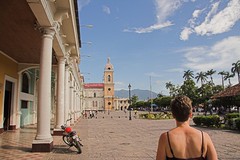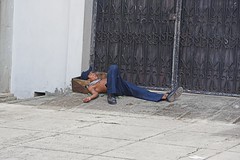Nueva Antigua or La Gran Nada?
A day after arriving in Granada we ambled toward the lake. We were hoping for a bit of a breeze and to see some of the changes that have come in the year since I last visited. Granada is nothing like the sleepy town I first came to in 1993. There were just two hotels and they had both lost whatever grandeur they once possessed. Restaurants were few and far between and tended toward small mom-and-pop shops serving Nicaraguan basics like rice and beans, pollo asado (roasted chicken), carne de res encebollado (beefsteak topped with grilled onions), plantains, etc. Mondays was soup day, and most places put out a steaming bowl of beef broth with vegetables, no matter the heat. Don’t get me wrong: I loved this food, but I longed for a bit more variety.
Today, by contrast, Granada has a number of nice hotels and hostels and dozens of places to eat, including pizza, tapas, Mexican, and more. And, of course, there are even more places to get traditional Nicaraguan fare. All of this has been fueled by a growing tourist economy that began to spring up about 5 years ago. The burgeoning economy, Granada’s colonial charm, and its cheaper real estate prices compared to Costa Rica, have also attracted a significant ex-pat community. I’m ambivalent about all the changes. On the one hand, the local economy has certainly grown and Granada has a new liveliness. Young people who used to flee Granada in search of jobs or an education, now seem to have options if they stay (or return). On the other hand, the real estate boom has all the marking of a bubble and native Granadinos find themselves ever more priced out of their ancestral homes. The influx of tourist dollars has also brought an attendant rise in crime. When I lived in Granada from 1994 to 1995, I would often walk the city at midnight, enjoying the late night cool. Today, mugging’s a good possibility if you walk alone past dark.
Right now Granada seems like a great place for a visitor with dollars. Quaint, yet lively, with opportunities for good food and an enjoyable nightlife. But it’s hard to say how it will shake out for your average Granadino. Will it bring more and sustained work? Will it help alleviate poverty? Or will it devolve into an insular ex-pat community known more for pricey restaurants and sex tourism? Certainly worth contemplating is recent work on Caribbean tourism, such as Mimi Sheller's Consuming the Caribbean: From Arawaks to Zombies (New York, 2003) and Polly Pattullo's Last Resorts: The Costs of Tourism in the Caribbean
(New York, 2003) and Polly Pattullo's Last Resorts: The Costs of Tourism in the Caribbean (London, 1996) is worth contemplating.
(London, 1996) is worth contemplating.
Will Granada become a new Antigua, and is that even desirable? Or is it, as a friend from Managua likes to say, just "la Gran Nada" (the great nothing).
Today, by contrast, Granada has a number of nice hotels and hostels and dozens of places to eat, including pizza, tapas, Mexican, and more. And, of course, there are even more places to get traditional Nicaraguan fare. All of this has been fueled by a growing tourist economy that began to spring up about 5 years ago. The burgeoning economy, Granada’s colonial charm, and its cheaper real estate prices compared to Costa Rica, have also attracted a significant ex-pat community. I’m ambivalent about all the changes. On the one hand, the local economy has certainly grown and Granada has a new liveliness. Young people who used to flee Granada in search of jobs or an education, now seem to have options if they stay (or return). On the other hand, the real estate boom has all the marking of a bubble and native Granadinos find themselves ever more priced out of their ancestral homes. The influx of tourist dollars has also brought an attendant rise in crime. When I lived in Granada from 1994 to 1995, I would often walk the city at midnight, enjoying the late night cool. Today, mugging’s a good possibility if you walk alone past dark.
Right now Granada seems like a great place for a visitor with dollars. Quaint, yet lively, with opportunities for good food and an enjoyable nightlife. But it’s hard to say how it will shake out for your average Granadino. Will it bring more and sustained work? Will it help alleviate poverty? Or will it devolve into an insular ex-pat community known more for pricey restaurants and sex tourism? Certainly worth contemplating is recent work on Caribbean tourism, such as Mimi Sheller's Consuming the Caribbean: From Arawaks to Zombies
Will Granada become a new Antigua, and is that even desirable? Or is it, as a friend from Managua likes to say, just "la Gran Nada" (the great nothing).




0 Comments:
Post a Comment
<< Home